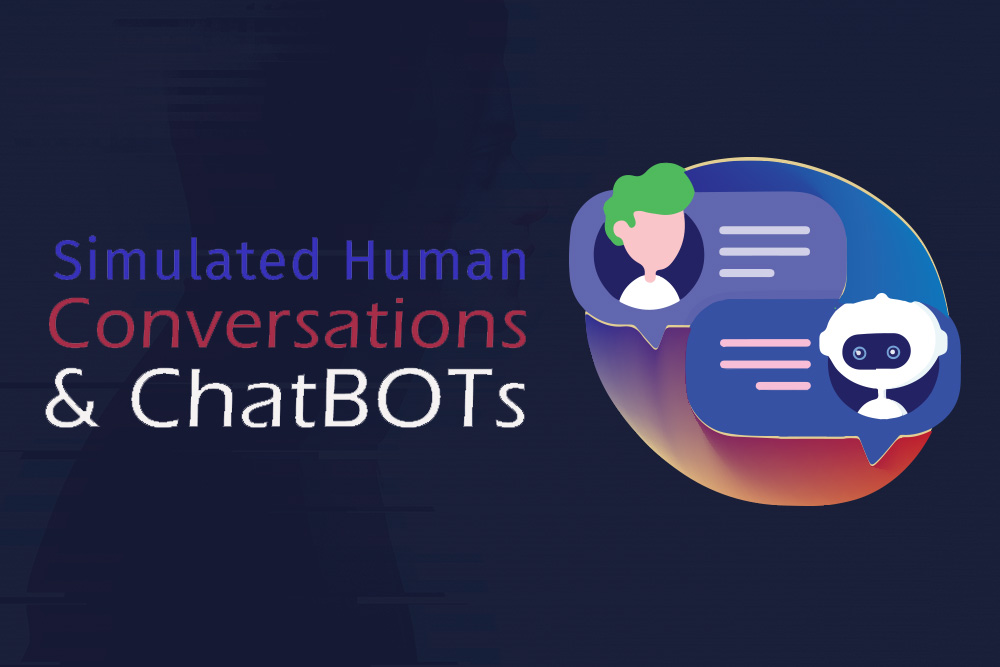Simulated Human Conversations & ChatBots
A ChatBot is a software application used to conduct an online chat conversation via text or text-to-speech. The term “ChatterBot” was originally coined by Michael Mauldin (creator of the first Verbot) in 1994 to describe these conversational programs. ChatBots are typically used in dialogue systems for various purposes including customer service, request routing, or information gathering. While some ChatBot applications use extensive word classification processes, Natural Language processors and sophisticated AI, others scan for general keywords and generate responses using common phrases obtained from an associated library or database.
Today, most ChatBots are accessed online via website popups, virtual assistants such as Google Assistant, Amazon Alexa or messaging apps such as Facebook Messenger or WeChat. ChatBots are typically classified into usage categories that include: commerce (ecommerce via chat), education, entertainment, finance, health, news and productivity.

ELIZA (The first ChatBot)
In 1950, Alan Turing’s famous article “Computing Machinery and Intelligence” was published, which proposed what is now called the Turing test as a criterion of intelligence. The notoriety of Turing’s proposed test stimulated great interest in Joseph Weizenbaum’s program ELIZA, published in 1966 which seemed to be able to fool users into believing that they were conversing with a real human.
Malicious Use
Malicious Care is frequently used to fill chat rooms with spam and advertisements, by mimicking human behavior and conversations or to entice people into revealing personal information, such as bank account numbers. They are commonly found on Yahoo! Messenger, Windows Live Messenger, AOL Instant Messenger and other instant messaging protocols. There has also been a published report of a ChatBot used in a fake personal ad on a dating service’s website.
Tay, an AI ChatBot that learns from a previous interaction, caused major controversy due to it being targeted by internet trolls on Twitter. The bot was exploited, and after 16 hours began to send extremely offensive Tweets to users. This suggests that although the bot learned effectively from experience, adequate protection was not put in place to prevent misuse. If a text-sending algorithm can pass itself off as a human instead of a ChatBot, its message would be more credible. Therefore, human-seeming ChatBots with well-crafted online identities could start scattering fake news that seems plausible, for instance making false claims during a presidential election. With enough ChatBots, it might be even possible to achieve artificial social proof.
ChatBots & CRM
Customer support is rapidly changing. Over the past ten years, customer contact centers have evolved quite a lot to meet the rising popularity of various digital communication channels. Nevertheless, phone calls still account for about 68 percent of all incoming support requests; another 32 percent comes from various digital channels such as live chats, SMS, email, and social media.
- The key advantages of using ChatBots include: ChatBots greatly improve interactions with clients. Clients have questions and chatbots can give a lot of answers.
- ChatBots are integrated into messenger apps, where people spend most of their time online nowadays.
- ChatBots save considerable time for your customer support team.
- ChatBots offer clients immediate responses.
- ChatBots are available 24/7.
- ChatBots allow you to reduce costs by hiring fewer people to staff call centers.
Centizen
A Leading IT Staffing, Custom Software and SaaS Product Development company founded in 2003. We offer a wide range of scalable, innovative IT Staffing and Software Development Solutions.
Contact Us
USA: +1 (971) 420-1700
Canada: +1 (971) 420-1700
India: +91 63807-80156
Email: contact@centizen.com
Our Services
Products
Contact Us
USA: +1 (971) 420-1700
Canada: +1 (971) 420-1700
India: +91 63807-80156
Email: contact@centizen.com






